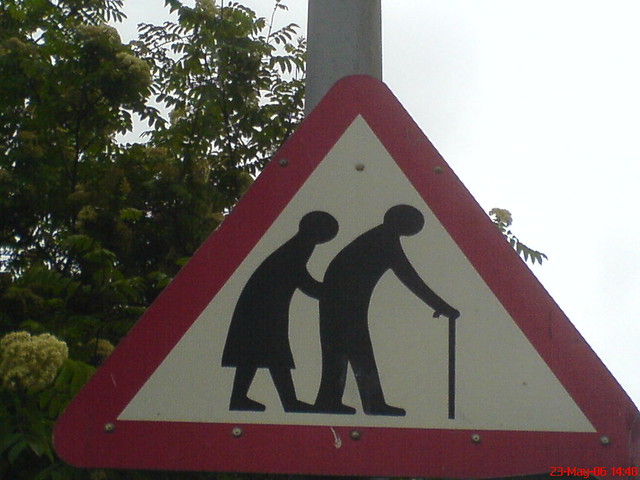I went to the cinema this week and saw The Iron Lady, Phyllida Lloyd's biographical(ish) film about Margaret Thatcher. There's lots I could comment on, but I'll limit myself here to some things that struck me as a gerontologist and someone who is particularly interested in normative and non-normative life courses.

(cc) Joybot
One of the things I really liked about the film was the fact that the central character was (when not in flashback) an old woman. So few films have protagonists even in mid-life that it was really refreshing and interesting to see one in deep old age (for further discussion of older people in films, can I recommend ageing, ageism and feature films and the work of Josie Dolan at UWE). One of the things I've been thinking a lot about in the last couple of years is how people can be enabled to better imagine their own ageing and eventual old age. Fictional portrayals of later life are an obvious way of helping with this but there aren't many out there (although the FCMAP project has a collection of novels here). While I loathed the real Margaret Thatcher in her heyday with all the fervour of a leftie teenager and young adult, I found the fictional portrayal of her old age deeply moving and sympathetic.
As I understand it, hallucinations are rare in most common forms of dementia, including the form that Margaret Thatcher is thought to have, but I'm not talking here about the reality or correctness of what is portrayed. As a way of representing the sheer impossibility of believing that someone who has been an intimate part of your life for 50 years is no longer there, I thought the hallucinations of Dennis worked really well. I don't know whether that is how people feel after such a bereavement but it certainly made me imagine being in that situation.
I also thought the film did a good job of conveying the ways in which older people are so often treated as incompetent, irrelevant and foolish. Scenes such as the one in the corner shop - when she is pushed out of the way by the man on his mobile phone - are entirely everyday. For example, the Research on Age Discrimination research, undertaken by members of the Centre for Ageing and Biographical Studies a few years ago, found that being treated as seemingly invisible was reported as one of the most prevalent forms of everyday ageism. But seeing this happen to someone who used to be the prime minister makes even clearer the fact that it doesn't matter who you used to be, once you are put in the category 'old person' you are at risk of being treated in this way.

(cc) rileyroxx
I was also interested in (but much less keen on) the way the film ended up focusing so much on her personal life, especially her relationships with her father, husband and children. I am suspicious that one of the reasons the film-makers decided to do this was because if they had failed to do this for a woman who was known to have been married and to have had children, it would have felt like too incomplete an account of her life. Filming a biography of a male public figure with only passing reference to his private life would probably be unremarkable but, since they wanted to make her at least somewhat sympathetic, I wondered whether this partly pushed them into featuring her private life more heavily. I don't know. I may be coming over all second-wave feminist on this one. It has been known.
And this made me think about the cultural difficulty of telling a story of someone's old age that doesn't make it seem as if it was their family and any descendants that really mattered in the end. In societies such as the UK, where paid employment is so highly valued, I wonder whether, once you are beyond paid employment, the main culturally available narrative is of the significance of family. As you may have read in the entry previous to this one, my colleague Jill Reynolds has found that some older people without children report that their friends with children and grandchildren seems to have lives (boringly) limited to their families. I'm sure that, for many people, their family does become the main focus of their lives when they are old. And that's fine. But for other people, such as those who haven't had children, who are estranged from their families and whose lives have not revolved around their families, such as Margaret Thatcher, I'd like there to be a greater range of ways of telling the story of someone's life.